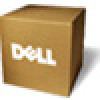Dell Broadcom NetXtreme Family of Adapters Broadcom NetXtreme II Network Adapt - Page 140
Configuring DCB, DCB Conditions
 |
View all Dell Broadcom NetXtreme Family of Adapters manuals
Add to My Manuals
Save this manual to your list of manuals |
Page 140 highlights
Using Data Center Bridging (DCB): Broadcom NetXtreme II Network Adapter User Guide switch acknowledges the C-NIC's willingness, then the switch will send the C-NIC the recommended ETS and PFC parameter settings. The DCBX protocol uses the Link Level Discovery Protocol (LLDP) to exchange PFC and ETS configurations between link partners. Configuring DCB By default, DCB is enabled on Broadcom NetXtreme II DCB-compatible C-NICs. DCB configuration is rarely required, as the default configuration should satisfy most scenarios. DCB parameters can be configured through BACS. See Using Broadcom Advanced Control Suite for more information on BACS. DCB Conditions The following is a list of conditions that allow DCB technology to function on the network. If DCB is enabled on the interface, DCBX is automatically enabled and carried out automatically once a link is established. If DCBX fails to synchronize with a compatible peer, the adapter will automatically fall back to default NIC behavior (no priority tagging, no PFC, no ETS). By default, the port will advertise itself as willing, and as such, will accept all DCB settings as advertised by the switch. If PFC is operational, PFC settings supersede link level flow control settings. If PFC is not operational, link level flow control settings prevail In NIC Partitioned enabled configurations, ETS (if operational) overrides the Bandwidth Weights assigned to each function. Transmission selection weights are per protocol per ETS settings instead. Maximum bandwidths per function are still honored in the presence of ETS. In the absence of an iSCSI or FCoE application TLV advertised through the DCBX peer, the adapter will use the settings taken from the local Admin MIB. Please read all Restrictions and Disclaimers. Back to Contents Page file:///T|/htdocs/NETWORK/BroadCom/71921/NetXtremeII/en/dcb.htm[9/26/2012 3:29:36 PM]















